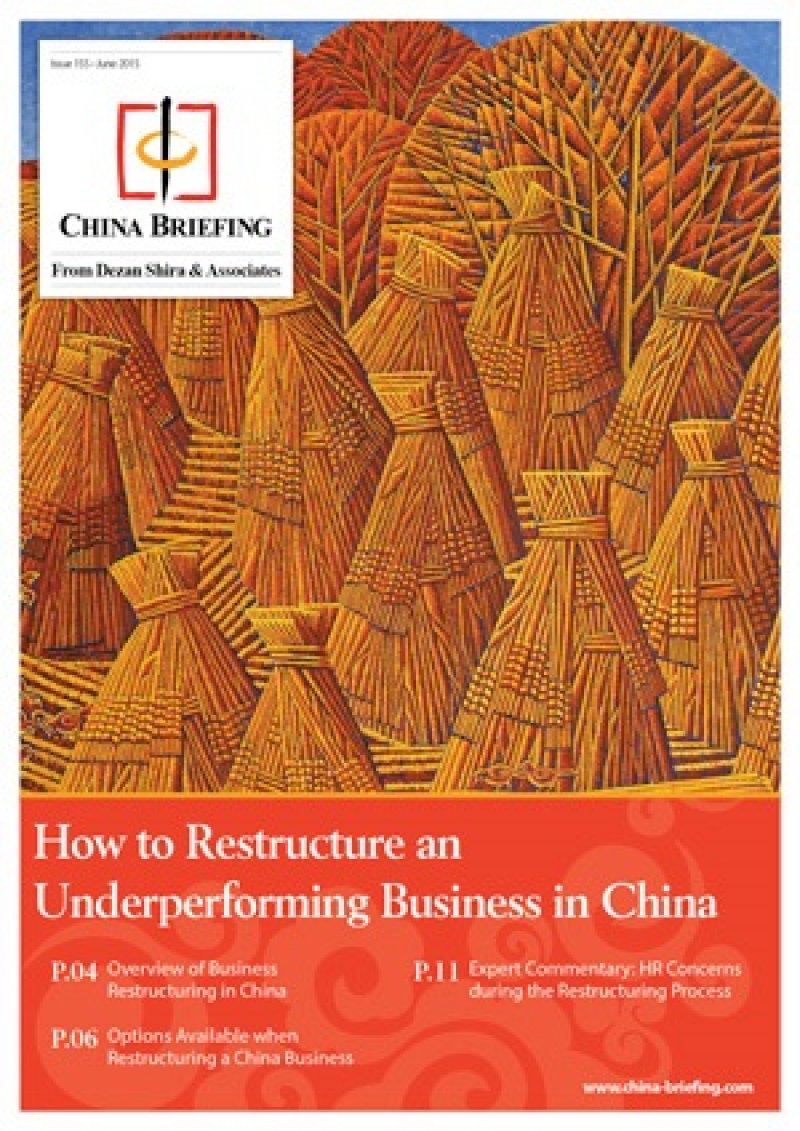Special Feature: Firing Senior Management in China
 By Allan Xu
By Allan Xu
Manager, Business Advisory Services
Dezan Shira & Associates, Shanghai
When it comes to hiring and firing in China, foreign managers and investors should not hold preconceived ideas about the strictness of China’s laws. Highly publicized cases of worker exploitation might give the impression that China unambiguously favor employers, but this is not so. In fact, China’s laws for firing employees are considerably more rigid than those in the U.S.
Firing senior managers is an especially complicated process in China that requires a thorough understanding of the country’s laws. Even before a decision to fire someone has been made, proactively preventing risks related to HR is important.
If an employer wishes to terminate a contract of a senior manager, there are a set of specified reasons for them to be able to. These include, but are not limited to:
- The employee materially breaches the employer’s rules and regulations
- Gross negligence by the employee causes substantial damage to the employer
- The employee has criminal liability imposed against them
These causes are stipulated in Article 39 of the PRC’s Labor Contract Law. If the case is taken to labor arbitration and the employer is found to have wrongfully terminated the employee, the employee can either demand their old job back or demand compensation that is double the compensation rate of a normal, lawful, termination.
![]() RELATED: Payroll and Human Resource Services
RELATED: Payroll and Human Resource Services
Accordingly, a company looking to fire senior management should expect to have to show strong evidence in support of their lawful decision to terminate. As part of this, the company should have a handbook of company regulations signed by all employees.
The Company Stamp
Chinese commercial law attaches high legal importance to the company stamp; its use is a necessity in many business operations.
There have been cases where outgoing employees have taken the company seal to paralyze the company and effectively take it hostage. This is an extraordinarily difficult situation, especially if the perpetrator was once the company’s official legal representative in China.
If a company seal is lost or stolen, an announcement must be made as soon as possible in an official journal; this makes it possible to cancel the seal and register a new one.
Companies should set up an internal application process for using the seal: staff members wishing to use it must submit a request to management, clearly stating their reasons for doing so.
 This article is an excerpt from the December issue of China Briefing Magazine, titled “Labor Dispute Management in China.” In this issue of China Briefing, we discuss how best to manage HR disputes in China. We begin by highlighting how China’s labor arbitration process – and its legal system in general – widely differs from the West, and then detail the labor disputes that foreign entities are likely to encounter when restructuring their China business. We conclude with a special feature from Business Advisory Manager Allan Xu, who explains the risks and procedures for terminating senior management in China. This article is an excerpt from the December issue of China Briefing Magazine, titled “Labor Dispute Management in China.” In this issue of China Briefing, we discuss how best to manage HR disputes in China. We begin by highlighting how China’s labor arbitration process – and its legal system in general – widely differs from the West, and then detail the labor disputes that foreign entities are likely to encounter when restructuring their China business. We conclude with a special feature from Business Advisory Manager Allan Xu, who explains the risks and procedures for terminating senior management in China. |
![]()
 Human Resources and Payroll in China 2015
Human Resources and Payroll in China 2015
This edition of Human Resources and Payroll in China, updated for 2015, provides a firm understanding of China’s laws and regulations related to human resources and payroll management – essential information for foreign investors looking to establish or already running a foreign-invested entity in China, local managers, and HR professionals needing to explain complex points of China’s labor policies.
How to Restructure an Underperforming Business in China
In this issue of China Briefing magazine, we explore the options that are available to foreign firms looking to restructure or close their operations in China. We begin with an overview of what restructuring an unprofitable business in China might entail, and then take an in-depth look at the way in which a foreign company can go about the restructuring process. Finally, we highlight some of the key HR concerns associated with restructuring a China business.
 Employing Foreign Nationals in China
Employing Foreign Nationals in China
In this issue of China Briefing, we have set out to produce a guide to employing foreign nationals in China, from the initial step of applying for work visas, to more advanced subjects such as determining IIT liability and optimizing employee income packages for tax efficiency. Lastly, recognizing that few foreigners immigrate to China on a permanent basis, we provide an overview of methods for remitting RMB abroad.
- Previous Article Z- und M-Visum: Sieben wichtige Dinge bei der Anstellung ausländischen Personals in China
- Next Article Navigating China’s Financial Leasing Industry – Setup Procedures and Market Opportunities










